 36 In Joppa there was a disciple named Tabitha (in Greek her name is Dorcas); she was always doing good and helping the poor. 37 About that time she became sick and died, and her body was washed and placed in an upstairs room. 38 Lydda was near Joppa; so when the disciples heard that Peter was in Lydda, they sent two men to him and urged him, “Please come at once!”
36 In Joppa there was a disciple named Tabitha (in Greek her name is Dorcas); she was always doing good and helping the poor. 37 About that time she became sick and died, and her body was washed and placed in an upstairs room. 38 Lydda was near Joppa; so when the disciples heard that Peter was in Lydda, they sent two men to him and urged him, “Please come at once!”39 Peter went with them, and when he arrived he was taken upstairs to the room. All the widows stood around him, crying and showing him the robes and other clothing that Dorcas had made while she was still with them.
40 Peter sent them all out of the room; then he got down on his knees and prayed. Turning toward the dead woman, he said, “Tabitha, get up.” She opened her eyes, and seeing Peter she sat up. 41 He took her by the hand and helped her to her feet. Then he called for the believers, especially the widows, and presented her to them alive. 42 This became known all over Joppa, and many people believed in the Lord. 43 Peter stayed in Joppa for some time with a tanner named Simon.
Many Jews living outside Judaea had two names, one Jewish
and one Greek or Latin
Dorcas was a disciple known for her practical works of mercy
and lived in Joppa a seacoast town in Dan, today known as Jaffa, South of Tel
Aviv. Joppa is a town on the Mediterranean coast, 35 miles northwest of
Jerusalem.
Women in the Christian community, like Dorcas, were models
of the virtues encouraged by Roman leaders: traditional family values like good
sense, courage, contentment, and fortitude.
 1 Timothy 2:9-10 says
1 Timothy 2:9-10 says 9 I also want the women to dress modestly, with decency and propriety, adorning themselves, not with elaborate hairstyles or gold or pearls or expensive clothes, 10 but with good deeds, appropriate for women who profess to worship God.
Dorcas is a perfect role model of a strong woman that had
good sense.
The Bible text does not tell us whether she possessed
physical beauty but we know that she was beautiful in the eyes of God and in
the eyes of the widows and the poor that she helped.
She gave herself, her time and her love to serve the
neediest among them of the day which were the widows. We could think of her as perhaps an example of
the woman who is “above rubies” in Proverbs 31
 It is believed that she was raised in a “Godly” home where
she learned to use her fingers and funds for the comfort of the needy. She was
well-known for her works and charitable deeds. Among her good works was making
clothing and coats for widows and the needy of her church and community. She
wasn’t only willing to give financially; she was willing to give of herself to
do the work the Lord had given her the talent to do.
It is believed that she was raised in a “Godly” home where
she learned to use her fingers and funds for the comfort of the needy. She was
well-known for her works and charitable deeds. Among her good works was making
clothing and coats for widows and the needy of her church and community. She
wasn’t only willing to give financially; she was willing to give of herself to
do the work the Lord had given her the talent to do.
Dorcas was dearly loved in her church. She wasn’t famous as
a prophetess; neither was she a preacher. Instead she was a woman full of good
works and charitable deeds. The people loved her because she cared for others
and demonstrated her caring in practical ways.
 When we are introduced to Dorcas there seems to be an indication
that she was a widow, or at the very least that she joined the widows in their
works of charity. We don’t know how long ago this had happened, but from the
number of people for whom Dorcas had made clothing, we can perhaps assume her
husband had died some years before. Dorcas had not stopped living because her
husband was gone. Instead she reached out to other believers and found a
meaningful and happy life in serving them.
When we are introduced to Dorcas there seems to be an indication
that she was a widow, or at the very least that she joined the widows in their
works of charity. We don’t know how long ago this had happened, but from the
number of people for whom Dorcas had made clothing, we can perhaps assume her
husband had died some years before. Dorcas had not stopped living because her
husband was gone. Instead she reached out to other believers and found a
meaningful and happy life in serving them.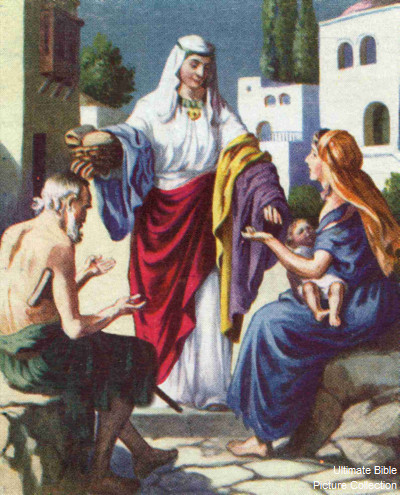 The original Greek text describes Dorcas, this widow-woman
as 'mathetria', a female disciple - the only time the New Testament uses this
word, in fact, the only named woman in scripture who is specifically called a
“disciple”. So immediately we know she is a woman of good repute. Some have
taken this to suggest that Dorcas held the office of deaconess. Certainly her
focus on providing practical help to other believers fits the kind of ministry
first-century deacons performed.
The original Greek text describes Dorcas, this widow-woman
as 'mathetria', a female disciple - the only time the New Testament uses this
word, in fact, the only named woman in scripture who is specifically called a
“disciple”. So immediately we know she is a woman of good repute. Some have
taken this to suggest that Dorcas held the office of deaconess. Certainly her
focus on providing practical help to other believers fits the kind of ministry
first-century deacons performed.
This might also be indicated by the fact that Peter took the
trouble to come to her from a neighbouring city, Lydda, when requested by the
community members.
A true disciple, Dorcas had learned of Jesus and had decided
to follow Him. She had adopted his views and lifestyle, lovingly living out His
commands by ministering to the poor around her.
James 1:27 explains
27 Religion that God our Father accepts as pure and faultless is this: to look after orphans and widows in their distress and to keep oneself from being polluted by the world.
There was no mistaking it anyone who knew Dorcas knew who she was and whom she followed.
James 1:27 explains
27 Religion that God our Father accepts as pure and faultless is this: to look after orphans and widows in their distress and to keep oneself from being polluted by the world.
There was no mistaking it anyone who knew Dorcas knew who she was and whom she followed.
The story in Acts indicates her prominence and the story goes on.
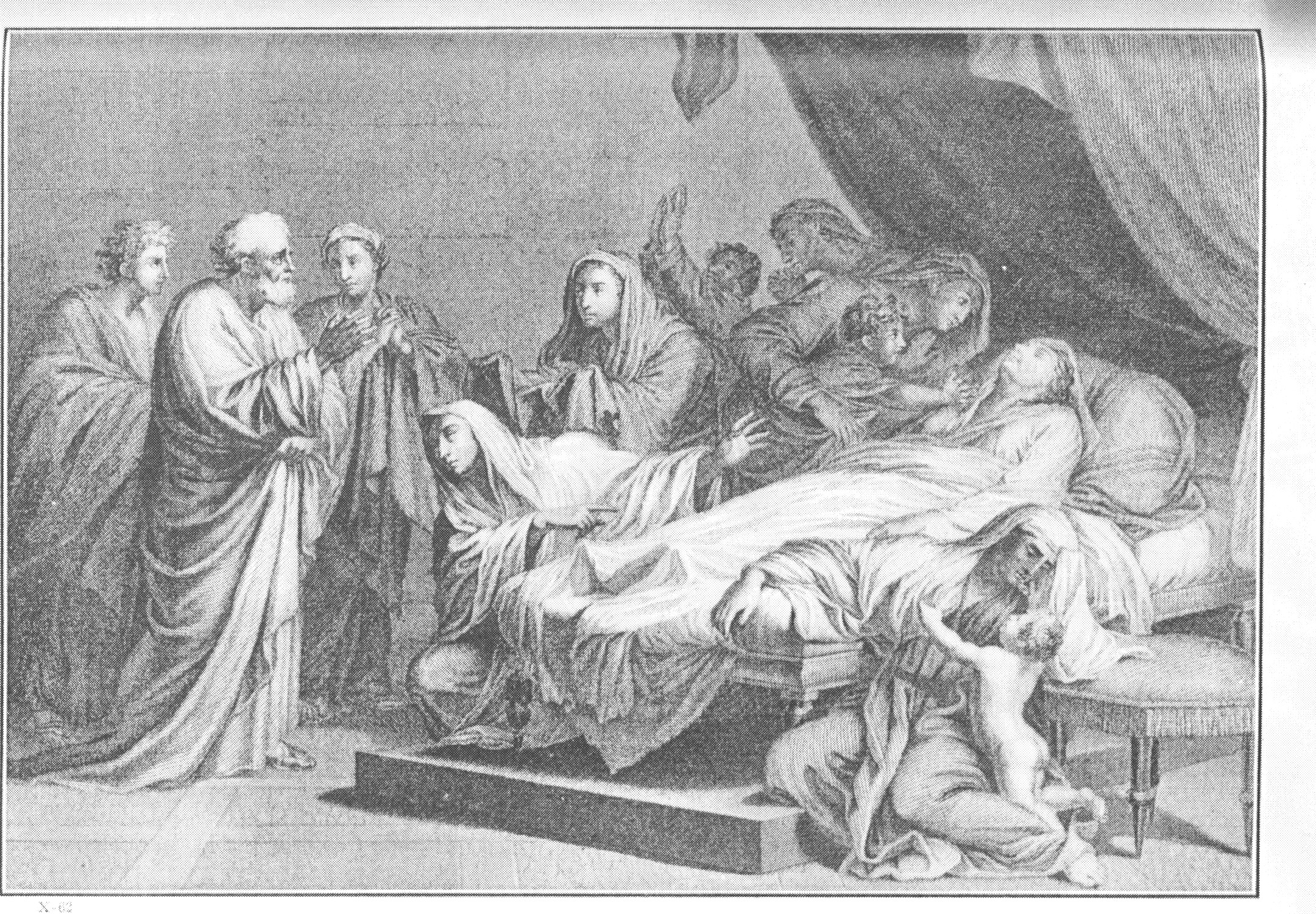
One day Dorcas became ill. Her illness is unspecified, but we may assume she was nursed by her friends; there was nothing corresponding to a hospital or medical centre at that time. Sick people were cared for, and treated, within their own home, by their friends and family.
 When she became sick, her fellow believers were deeply
concerned. When her friends, at the church she attended, heard that Peter was
nearby, they send two men to urged Peter to come and bring him to Dorcas' house
- no doubt the widows of Tabitha's circle of friends had many sons and nephews
who could be roped in for this sort of task. Undoubtedly, the people had heard
that Peter exercised supernatural powers, and they hoped that he could do
something supernatural for Dorcas.
When she became sick, her fellow believers were deeply
concerned. When her friends, at the church she attended, heard that Peter was
nearby, they send two men to urged Peter to come and bring him to Dorcas' house
- no doubt the widows of Tabitha's circle of friends had many sons and nephews
who could be roped in for this sort of task. Undoubtedly, the people had heard
that Peter exercised supernatural powers, and they hoped that he could do
something supernatural for Dorcas.
And then she died. It was a sad day for the church of Joppa they
had lost someone they loved and who was an important part of the family of
believers. However, they had faith that God would do something when one of its
most beloved and devoted members died in the midst of her works of charity.
Dorcas was well loved but it appeared that she did not have any relatives to
mourn her passing. The widows, who were her friends, washed, clothed and laid
her out in an upper room; and grieved for her.
 The 'upper room' has special significance in the Christian
story. An upper room was the scene of the Last Supper in Jerusalem, and it is
mentioned again, in the story of Tabitha. It is a space that is removed from
the hurly-burly of the ground-floor courtyard and public rooms, a relatively
quiet place where contact with God might take place.
The 'upper room' has special significance in the Christian
story. An upper room was the scene of the Last Supper in Jerusalem, and it is
mentioned again, in the story of Tabitha. It is a space that is removed from
the hurly-burly of the ground-floor courtyard and public rooms, a relatively
quiet place where contact with God might take place.
Ritual mourning follows her death. She has many friends, and
they all wish to show their respect and affection by openly grieving.
Mourning was not a restrained activity in the ancient Middle
East. People showed their grief by wailing, crying, and tearing the upper part
of their woven garment. The more noise, the more the dead person was loved.
 Peter responds immediately, and his journey is significant.
It is a twelve-mile walk to Joppa, and by travelling there Peter is moving to
the limits of Jewish territory - further away from Jerusalem, which at that
time was hostile to the infant Christian church.
Peter responds immediately, and his journey is significant.
It is a twelve-mile walk to Joppa, and by travelling there Peter is moving to
the limits of Jewish territory - further away from Jerusalem, which at that
time was hostile to the infant Christian church.
When Peter arrived to the place where her wake was being
held he found that Dorcas had died. He is taken to Dorcus's body, laid out in
the upper room of her house. Her friends are gathered around her body. They
show Peter the garments she has made for the poor. The evidence for a well-lived
life is there for all to see.
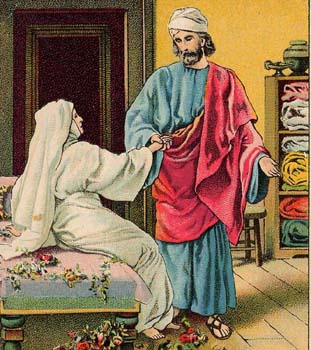 Even in their grief, her friends wanted Peter to know what a
wonderful woman Dorcas had been. Acts says
Even in their grief, her friends wanted Peter to know what a
wonderful woman Dorcas had been. Acts says39 Peter went with them, and when he arrived he was taken upstairs to the room. All the widows stood around him, crying and showing him the robes and other clothing that Dorcas had made while she was still with them. (Acts 9:39).
Peter, when he saw how much she was loved, was moved by all
of the people who were mourning this saintly woman whom he had been told much
about by the men who came to get him. Peter who had learned to walk full of the
Holy Spirit knew God had brought him there for a reason. He asked the people to
leave him alone with the body so that the room becomes peaceful and quiet again.
He fell to his knees and prayed facing away from the body - perhaps to focus
his entire mind on God. Peter was moved enough to pray for her
restoration. As Peter prayed, I believe
he would have called to mind the raising of Lazarus - John 11: 41-44
41 So they took away the stone. Then Jesus looked up and said, “Father, I thank you that you have heard me. 42 I knew that you always hear me, but I said this for the benefit of the people standing here, that they may believe that you sent me.”
43 When he had said this, Jesus called in a loud voice, “Lazarus, come out!” 44 The dead man came out, his hands and feet wrapped with strips of linen, and a cloth around his face.
Jesus said to them, “Take off the grave clothes and let him go.”
He would have also remembered a promise Jesus had made: John14:12-13
12 Very truly I tell you, whoever believes in me will do the works I have been doing, and they will do even greater things than these, because I am going to the Father. 13 And I will do whatever you ask in my name, so that the Father may be glorified in the Son.
A good disciple follows their master and that is what Peter
did. Jesus said “40 The student is not above the teacher, but everyone who is fully trained will be like their teacher.” (Luke 6:40).
Peter simply copied what he saw the Lord do in a similar situation. In Mark 5 Jesus raised a little girl back to life. Like Jesus, Peter therefore asked everyone to leave the room. Like Jesus he took her by the hand and said “Tabitha koum” (“Tabitha, I say to you, get up.”). And like Jesus, the Lord answered Peter’s prayer and raised Tabitha from the dead. The Bible mentions only seven people who were raised from the dead. And Tabitha is the only adult woman among them. Notice the effect – many came to believe in the Lord as a result. The life, death and resurrection of Tabitha helped spread the good news of the life, death and resurrection of Jesus.

Peter simply copied what he saw the Lord do in a similar situation. In Mark 5 Jesus raised a little girl back to life. Like Jesus, Peter therefore asked everyone to leave the room. Like Jesus he took her by the hand and said “Tabitha koum” (“Tabitha, I say to you, get up.”). And like Jesus, the Lord answered Peter’s prayer and raised Tabitha from the dead. The Bible mentions only seven people who were raised from the dead. And Tabitha is the only adult woman among them. Notice the effect – many came to believe in the Lord as a result. The life, death and resurrection of Tabitha helped spread the good news of the life, death and resurrection of Jesus.

Though we don’t know what went through Peter’s mind as he
knelt and prayed at Dorcas’ bedside, we do know that God worked through him in
an extraordinary way.
When he rose from prayer, led by the Spirit he called to her
using her Jewish name, Tabitha, and drawing on the same source of power that
Jesus had, he commands her to get up. The dead body responds. She opens her
eyes, sees Peter, and sits up. He extends his hand to her and raises her up
into a standing position. Then he called her friends (believers and the widows)
and presented her to them alive, who then see with their own eyes what has
happened.

The benefits of this miracle go far beyond Tabitha and the circle of friends who mourned her death and rejoiced at her restoration to life. Acts does not attempt to describe their gaping amazement.
It simply records that because of this, it became known all over Joppa and many people believed in the Lord.
Peter and the first Christians are inspired and heartened by the event and the infant Church spreads and grows because of this miracle. The resurrection of Dorcas caused a great revival in Joppa as the message rang “Dorcas is alive again.” Her resurrection convinced many people of the truth of the Christian faith and many people believed in the Lord and the church must have been filled with the people that accepted Christ as their Savior because of this miracle.
And though scripture doesn’t tell us how Dorcas responded to her incredible experience, it doesn’t take much to imagine her joy.
But it is important to see that there are two dimensions to the raising of Tabitha:
she is restored to
life and
she is returned to
her friends and community.
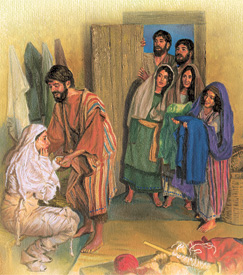 The life of the body is one thing, but it must be
accompanied by life within a community.
The life of the body is one thing, but it must be
accompanied by life within a community.
 The life of the body is one thing, but it must be
accompanied by life within a community.
The life of the body is one thing, but it must be
accompanied by life within a community.
Dorcas did not aspire to be a leader. She was content to be
a servant of the Lord. I believe it is even possible that she never realized
that the miracle of her resurrection had caused such a revival but I believe
that was the way it was with most of the people of the Bible, they never knew
the results of how the Lord used them for His glory.
God still uses willing servant’s hearts today, “seek ye first the kingdom of God and His
righteousness” and who knows you might be the one God chooses to use to
glorify His name.
It’s clear that Dorcas was deeply involved in the lives of
the members of her congregation. Although a widow herself, she had made “tunics
and garments” for the other widows in the church and undoubtedly for other needy
folk as well.
But ministry involves more than distributing clothing. Those
Dorcas served truly loved her. She must have been so caring, so involved in the
lives of those she helped, that her giving was never perceived as demeaning or
as charity. Dorcas had the gift of giving herself even as she gave the clothing
she made for others.
Like a good neighbour, Dorcas was always there for others.
And people loved her for herself, not just for what she did for them.
Her simple concern for others rather than powerful speaking
or a great singing voice won Dorcas the love of her friends and neighbours.
Sometimes in our desire for a more public ministry we forget that the greatest
in God’s kingdom are called to be servants, and servants are called to care for
those they serve.


Serving others wins a great reward here as well as
hereafter. Look how those Dorcas cared for loved her. We get so caught up in
accumulating things that we seem to have no time to love one another. Yet
loving relationships fill the heart as no possessions can.
Dorcas’ work of making clothes and helping the poor may
sound insignificant when compared to the outstanding works of the apostles, but
they were enough to gain the love of her community and enough that God saw fit
to restore her life. It’s our love for God and the love we share with others
that makes us beautiful in God’s sight. Dorcas was a good woman who was so
loved by the family of believers that they prayed for a miracle and God granted
it.
We know little about Tabitha. Her reputation was made from
something as simple as sewing clothing for the poor. It could just as easily
have been cooking. It seems this was her one talent. Not particularly
remarkable you might think and yet, Tabitha surpasses every other woman in the
Bible. You might never have considered sewing as important a gift as say
teaching or prophecy, but the fact is, she is the only one called a disciple -
a disciple of the Lord Jesus Christ. This should teach us not to despise the
gift of helps, or undervalue practical serving. She opened her heart to Jesus
and that changed everything. The word ‘disciple’ means a learner, a follower,
and that became her motivation in sewing clothes. It was out of gratitude for
Jesus that she dedicated her one gift to Jesus.
Can you do that?
This is the reason I am sure Tabitha was “always doing good
and helping the poor”. Because she was following the example of Jesus,
following the prompting of Jesus, to do good and help those in need.
She could sew and so she sewed to the best of her ability.
She was sewing for Jesus.
Can you do that?
What are you good at?
What do you enjoy doing?
What energises you?
What is your contribution to your church?
To the poor in your community?
To widows and orphans?
What seemingly insignificant talent or ability do you
possess that would mean a great deal to someone in need?
What do you have in your hands this morning?
If God could use Tabitha with something as basic as a
needle, what might he use in your hands?
What gifts has the Lord entrusted to you?
What is he calling you to do with them?
What lights your fire?
What are you passionate about?
Are you channelling that gifting or passion for Jesus?
What are you doing for Jesus?
It can be as simple as sewing or baking, fixing or driving.


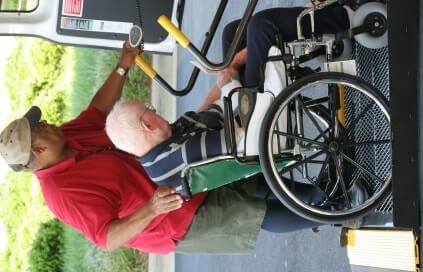



“Each of you should use whatever gift you have received to serve others, as faithful stewards of God’s grace in its various forms.” (1 Peter 4:10)
 True faith expresses itself in deeds not words. You have
heard the expression. “Action speaks louder than words”. The highest calling in
Christian ministry is to care in practical ways for the most vulnerable in
society, especially widows and orphans. In previous generations, ports like
Joppa, would have had a high proportion of widows, more than other towns.
During bad weather, fishermen, merchant and naval seaman were often shipwrecked
and drowned. Their wives and children lost not only their husbands and fathers
but also their income. That is why the Lord instructs his people:
True faith expresses itself in deeds not words. You have
heard the expression. “Action speaks louder than words”. The highest calling in
Christian ministry is to care in practical ways for the most vulnerable in
society, especially widows and orphans. In previous generations, ports like
Joppa, would have had a high proportion of widows, more than other towns.
During bad weather, fishermen, merchant and naval seaman were often shipwrecked
and drowned. Their wives and children lost not only their husbands and fathers
but also their income. That is why the Lord instructs his people:
“Religion that God our
Father accepts as pure and faultless is this: to look after orphans and widows
in their distress and to keep oneself from being polluted by the world.”
(James 1:27)
If we want to influence people for Christ, as Tabitha
clearly did, then use your gift to serve them, willingly and joyfully. Many of
the widows of Joppa were walking around in clothes made by Tabitha. She became
a person of importance in the church because she found fulfilment in, and
focussed her serving in doing what she was good at. She realised her potential.
Are you?
Are you?
Tabitha began a movement that spread well beyond her
community. She has inspired literally millions of women and men to use whatever
gift they have received to serve others. May God inspire you to use your gifts
for his glory today.
The Legacy of Tabitha – sewing
for Jesus. What will your legacy be?

 Today, the memory of Dorcas is still a part of our society. Dorcas,
is honored with a feast day in the United States of America on January 27. The Dorcas Society is a local group of people, usually based in a church, with a
mission of providing clothing to the poor. Activities usually include making
and distributing garments, supplying food for needy families, caring for the
fatherless and widows and ministering to the sick.
Today, the memory of Dorcas is still a part of our society. Dorcas,
is honored with a feast day in the United States of America on January 27. The Dorcas Society is a local group of people, usually based in a church, with a
mission of providing clothing to the poor. Activities usually include making
and distributing garments, supplying food for needy families, caring for the
fatherless and widows and ministering to the sick.
The original society was founded in Douglas, Isle of Man on
December 1, 1834, as part of the community's thanksgiving for being spared from
an outbreak of cholera. The poorer families in town had their clothes and
bedding destroyed as part of the effort to prevent the disease. Today there are
other Dorcas societies around the world, providing clothing and other physical
needs.
Sermon Fiona Van Lent 21/4/13
All scripture is taken from New International Version 1984
Sermon Fiona Van Lent 21/4/13
All scripture is taken from New International Version 1984

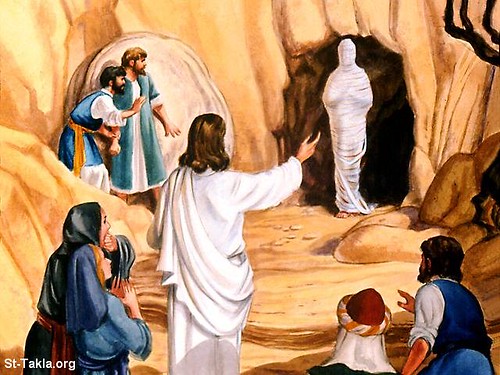
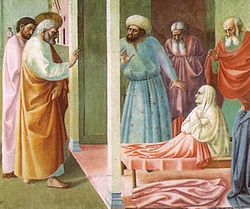



What a wonderful post. Our youngest, our only daughter, is named Tabitha. We named her, with God's prompting, for this wonderful woman in the Bible. And now at age 14 she is a wonderful sewer and has a 'helping' spirit.
ReplyDeleteThere is much to learn from her story, I like the way you highlighted how she was a vital part of her community because of her good deeds - which on the surface could be deemed as insignificant.
Such good advice: find what God has given you abilities in and use it for His glory. You have given me much to ponder on today - thank you.
Oh, and have you ever noticed the name on the lid of those little round pale blue tins of pins? Dorcas!
Thank you and Yes I noticed when I was searching for stiff. Never thought there was anything significant to it but now I know.
ReplyDeletehttp://ts3.mm.bing.net/th?id=H.4697355143022874&pid=15.1